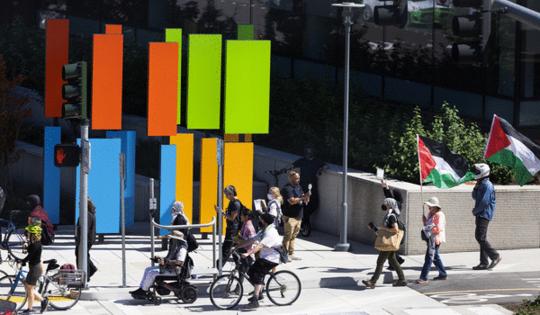Pressured on Israel work, Microsoft asks employees to flag violations
Published in Business News
Microsoft is creating a new system for employees to raise concerns over how its technology is used, in response to reports about mass surveillance data on Palestinian civilians stored on its cloud servers.
In an internal memo sent to employees on Wednesday, Microsoft President Brad Smith said the company had created a Trusted Technology Review" section in its Microsoft Integrity Portal. The portal is an internal site where employees can flag workplace behavior, legal, ethical and security concerns.
The move is the latest from Microsoft after months of probes into how the Israel Ministry of Defense was using the company's Azure cloud technology, prompted by reports from The Guardian.
The company first launched an investigation earlier this year, in which it found no evidence Azure technology was used by Israel to target people in the Israel-Hamas war in Gaza. Over the summer, The Guardian and two regional publications — +972 Magazine, an Israeli-Palestinian outlet, and Hebrew-language outlet Local Call — reported that Israeli military spy agency Unit 8200 was using Microsoft’s cloud computing services to store surveillance data on civilians in Gaza and the West Bank.
Microsoft then launched a second investigation in mid-August. In late September, Smith wrote in a company blog post that Microsoft found evidence that corroborated some of The Guardian's reporting. The company then cut off specific cloud computing services to Unit 8200, citing violations over the company's terms of service.
Amid reports of the Israel government's use of Microsoft's technology, the company has faced numerous protests, mostly at either high-profile events or on its Redmond campus.
Smith said Wednesday that after the September update, the company would continue to "share lessons learned and how we will apply these going forward."
The review system is the first move Smith has shared since September. He said Microsoft's non-retaliation policy applies to it and that employees can raise concerns anonymously.
The company, Smith said, will also strengthen its "existing pre-contract review process for evaluating engagements that require additional human rights due diligence.
No Azure for Apartheid, the group protesting Microsoft, started its demonstrations with employees disrupting company events, including a 50th anniversary on Microsoft’s campus and an annual conference in downtown Seattle earlier this year.
Those employees were fired and tensions escalated in August when the group occupied a plaza on Microsoft’s Redmond campus and several were arrested. Later in August, four employees were fired after protesters breached Smith’s office and participated in a sit-in.
The group has responded to each of Microsoft's updates with repeated demands that the company sever all ties with the Israeli government. Microsoft said in September it wasn't cutting any access to Israel outside of Unit 8200.
Other tech companies are facing employee protests as well. Amazon and Google have both faced protests from employees over the $1.2 billion joint contract the companies had with Israel called Project Nimbus.
The Guardian reported last week that Amazon and Google had agreed to a list of demands from the Israeli government that included unrestricted access to technology and alerting Israel if the companies disclosed data to foreign courts or investigators. Both companies have denied any agreement to evade legal obligations.
The report also said Microsoft lost out on the Nimbus contract partially because it wouldn't meet some of Israel's demands.
©2025 The Seattle Times. Visit seattletimes.com. Distributed by Tribune Content Agency, LLC.












Comments